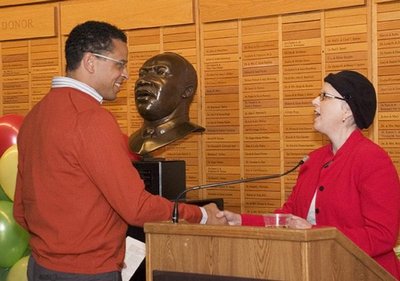January 31, 2008
Helping his dream come true
Dr. Benjamin Danielson, medical director of Odessa Brown Children’s Clinic, was awarded the 2008 UW Health Sciences Center Martin Luther King Jr. Distinguished Service Award for his work in addressing inequality in health care.
The award was presented at the UW Medical Center/Health Sciences Administration MLK Tribute Thursday, Jan. 17. It is given annually to someone in the community who exemplifies King’s call to “Make a career of humanity. Commit yourself to the noble struggle for equal rights. You make a greater person of yourself, a greater nation of your country, and a finer world to live in,” Kathryn Waddell, executive director of Health Sciences Administration, said, quoting Dr. King.
“Dr. Benjamin Danielson has embraced the meaning of Dr. King’s words and works tirelessly to address health disparities, or to use his words, the health inequalities that exist,” she said when presenting the award.
Danielson, a clinical associate professor in the UW School of Medicine’s Division of General Pediatrics, completed his pediatric residency at Children’s Hospital and Regional Medical Center. In 1999, he was named medical director of the Odessa Brown Children’s Clinic, a community clinic of Children’s Hospital. The clinic, located in Seattle’s Central District, provides medical, dental and mental health services for a culturally diverse, predominately low-income patient population.
He is chair for the Cultural Competency Theme Committee, under the UW School of Medicine Office of Multicultural Affairs CCPriME program, where he works to promote diversity and cultural competency throughout the medical school curriculum, as well as to raise awareness about health inequalities. He participates in the African American Mentor Network and has served as a mentor for underrepresented college students interested in medicine through the UW Summer Medical & Dental Education Program. Danielson was appointed to the Pacific Northwest Research Institute Board of Trustees and serves on the King County Action Plan Steering Committee.
Danielson said, in a telephone interview, that he was both honored and humbled to receive the award. “I feel humble because if you ever achieve anything, it is through the help of so many other people.
“I also feel humble because I participate in a system that is so fundamentally flawed — in every health care setting in this country, the profession contributes to inhumane practices,” Danielson said, noting the profound effects of institutional racism on health outcomes.
“I’ve been interested in institutional racism for a long time. There have been great strides made, but when you stratify by race and ethnicity, you see that some populations are not being treated the same.”
Citing breast cancer, sudden infant death syndrome, childhood leukemia and heart attacks as examples, Danielson said that the mortality rates among African Americans in each case were “similar to those of Caucasians 30 years ago.”
Danielson said he thinks that using the term “health disparities” is a copout from talking about racial inequality and injustice.
“This is a complex issue. I call it infrared racism, because it’s just beyond the visible spectrum. That makes it hard for people to latch onto, but it sure is there and it affects people.
“You know, I don’t feel all that great about putting people into categories, because race is a social category that has less to do with the way you see yourself than the way others see you and treat you. But when you look at the stratification of the five racial and ethnic categories (African American, Caucasian, Asian/Pacific Islander, Native American, Hispanic), they’re accurate to the extent that they elucidate differences.”
Danielson said that it is imperative that health care professionals bring this issue to the foreground and not hide it in the semantics of health care disparities, socioeconomic disparities, or lack of access.
“We’re dealing with a more complex and difficult issue that we don’t want to talk about, because it’s hard to talk about how we treat people differently because of the color of their skin. But, we must talk about it.”

